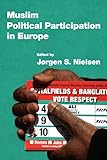Muslim Political Participation in Europe / Jørgen S. Nielsen.
Material type: TextPublisher: Edinburgh : Edinburgh University Press, [2022]Copyright date: ©2013Description: 1 online resource (360 p.)Content type:
TextPublisher: Edinburgh : Edinburgh University Press, [2022]Copyright date: ©2013Description: 1 online resource (360 p.)Content type: - 9780748646944
- 9780748646951
- 323/.042088297 23
- D1056.2.M87 M8553 2014eb
- online - DeGruyter
| Item type | Current library | Call number | URL | Status | Notes | Barcode | |
|---|---|---|---|---|---|---|---|
 eBook
eBook
|
Biblioteca "Angelicum" Pont. Univ. S.Tommaso d'Aquino Nuvola online | online - DeGruyter (Browse shelf(Opens below)) | Online access | Not for loan (Accesso limitato) | Accesso per gli utenti autorizzati / Access for authorized users | (dgr)9780748646951 |
Frontmatter -- Contents -- List of tables and figures -- 1. Introduction -- Part One. Laying foundations: national and local elections -- 2. Muslim political participation in Belgium: an exceptional political representation in Europe -- 3. Muslim political participation in Germany: a structurationist approach -- 4. Political opinions and participation among young Muslims in Sweden: a case study -- 5. Lithuanian Muslims’ attitudes toward participation in the democratic political process: the case of converts -- 6. Political participation of European Muslims in France and the United Kingdom -- Part Two. Participation as integration -- 7. Muslim collective mobilisations in contemporary Europe: new issues and new types of involvement -- 8. How politically integrated are Danish Muslims? Evidence from the Muhammad cartoons controversy -- 9. Limits and potentialities of the Italian and British political systems through the lens of Muslim women in politics -- 10. Representing ‘Islam of the banlieues’: class and political participation among Muslims in France -- Part Three. Institutions as gateways -- 11. Creating the image of European Islam: the European Council for Fatwa and Research and Ireland -- 12. The political participation of Polish Muslim Tatars – the result of or the reason for integration? From Teutonic wars to the Danish cartoons affair -- 13. The Alevi quest in Europe through the redefinition of the Alevi movement: recognition and political participation, a case study of the FUAF in France -- 14. Leicester Muslims: citizenship, race and civil religion -- Part Four. Breaking the bounds -- 15. Muslims and electoral politics in Britain: the case of the Respect Party -- 16. Clichés are funny as long as they happen on stage: comedy as political criticism -- Notes on the contributors -- Index
restricted access online access with authorization star
http://purl.org/coar/access_right/c_16ec
Analyses European Muslim communities' developing involvement in their political environment and related Muslim and public debatesMuslims are making themselves noticed in the political process of Europe. But what is happening behind the sensational headlines? Jørgen Nielsen looks at the processes and realities, from voting patterns in local and national assemblies to the tensions between ethnic, political and religious identities. These developments drive internal Muslim debates including whether Muslims should take part in the democratic process at all, and rivalries over who should represent Muslims. They also inspire sharp discussion in Europe: how should European states view the increasingly active role of Muslims in the public space? Does it signal integration or separation?Key Features16 chapters based on up-to-date research on European Muslim political participationAnalyses and compares local and national situations in Belgium, Catalonia, Denmark, France, Germany, Ireland, Italy, Lithuania, the Netherlands, Poland, Sweden and the UKFocuses on issues such as Muslim women and youth
Mode of access: Internet via World Wide Web.
In English.
Description based on online resource; title from PDF title page (publisher's Web site, viewed 29. Jun 2022)


